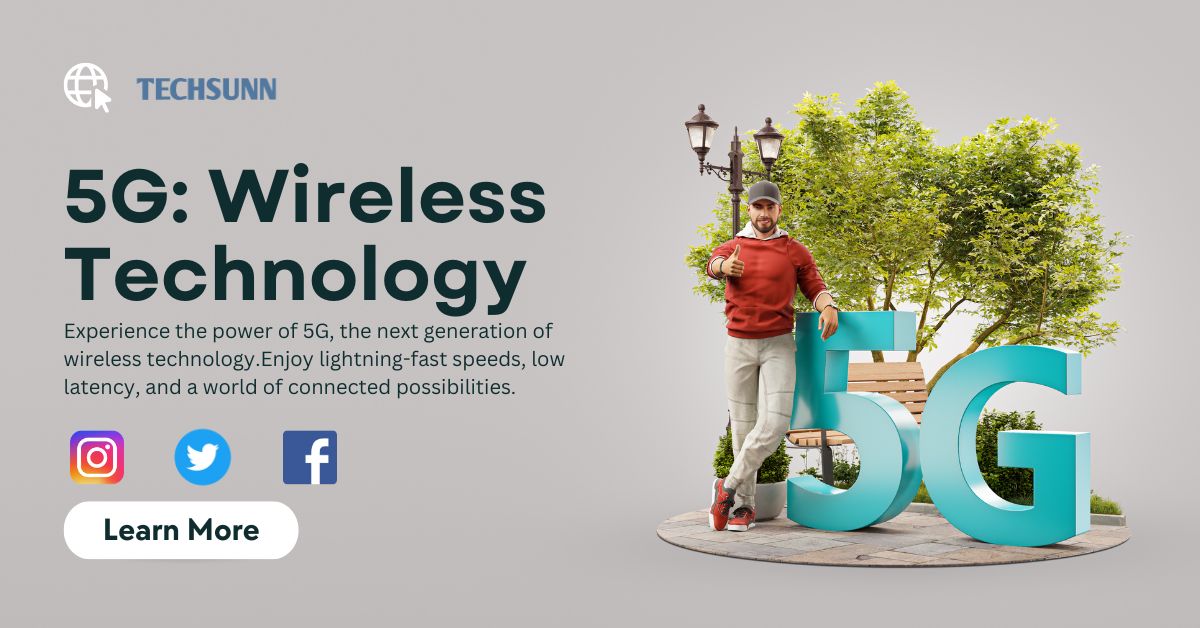5G: The Next Generation of Wireless Technology

Experience the power of 5G, the next generation of wireless technology. Enjoy lightning-fast speeds, low latency, and a world of connected possibilities.
5G: Wireless Technology
5G is the fifth generation of cellular network technology. It is intended to provide much faster speeds, reduced latency, and more capacity than previous cellular network generations. It is anticipated that 5G will alter the manner in which we live as well as the way in which we work by enabling new applications such as ultra-high-definition streaming video, virtual reality, and self-driving autos.
How does Wireless Technology work?
5G employs a new set of radio frequencies that are higher in frequency than previous generations of cellular networks. As a result, 5G networks can carry data more quicker than earlier generations of cellular networks. 5G also employs a new technique known as beamforming, which enables the signal to be focused on the device receiving the data. This lowers interference while also improving performance.
Read Also: Blockchain Technology: The Data Security of the Future
What are the benefits of 5G?
5G offers several benefits over previous generations of cellular networks, including:
- Faster speeds: 5G is expected to offer speeds up to 100 times faster than 4G LTE. As a direct consequence of this, users will be able to watch high-definition video without experiencing buffering issues, download movies and videos in a matter of seconds, and play online games without experiencing latency.
- Lower latency: Latency is the time it takes for data to travel from one point to another. 5G is expected to offer latency as low as 1 millisecond. Real-time applications, such as autonomous cars and virtual reality, will be able to operate faultlessly as a result of this development.
- Increased capacity: 5G is expected to offer up to 100 times the capacity of 4G LTE. This permits a greater number of devices to connect to the network simultaneously without resulting in congestion on the network.

What are the applications of 5G?
5G is expected to revolutionize the way we live and work, enabling new applications such as:
- Ultra-high-definition streaming video: 5G will allow users to stream ultra-high-definition (UHD) video without buffering. On-the-go viewing of UHD movies and television programs will become feasible as a result of this development.
- Virtual reality: 5G will make virtual reality (VR) more immersive and realistic. This will make VR more accessible to consumers and businesses.
- Self-driving vehicles: 5G will enable self-driving cars to function safely by providing high-speed, low-latency communication.
- Remote surgery: 5G will enable surgeons to do remote surgery. This will enable surgeons to do operations on patients who live in distant places or are unable to get to a hospital.
- Remote education: 5G will allow students to attend courses from anywhere in the world. Students who reside in remote locations or who have trouble traveling to a typical school can benefit from this.
- Remote work: 5G will make it possible for people to work remotely from anywhere in the world. This will give people more flexibility and freedom in their work lives.
- Industrial automation: 5G will be used to automate industrial processes. This will make factories more efficient and productive.
- Smart cities: 5G will be used to create smart cities. Smart cities are cities that use technology to improve the lives of their citizens. This could include things like using 5G to improve traffic management, provide real-time information about public transportation, or monitor air quality.
Here are some other potential applications for 5G:
- Agriculture: 5G can be used to monitor crops and livestock, and to control irrigation systems.
- Energy: 5G can be used to monitor power grids and to control smart meters.
- Manufacturing: 5G can be used to automate manufacturing processes and to control robots.
- Retail: 5G can be used to provide real-time inventory information and to track customer behavior.
- Logistics: 5G can be used to track shipments and to optimize delivery routes.
- Public safety: 5G can be used to improve communication between first responders and to provide real-time information about emergencies.
Here are some of the potential applications of 5G in finance:
- Real-time trading: 5G can be used to provide real-time data and analytics to traders, which can help them make faster and more informed decisions.
- Automated trading: 5G can be used to power automated trading systems, which can help to reduce costs and increase efficiency.
- Blockchain: 5G can be used to power blockchain-based applications, such as decentralized finance (DeFi) and non-fungible tokens (NFTs).
- Virtual reality (VR) and augmented reality (AR): 5G can be used to power VR and AR applications, which can be used for training, customer service, and marketing.
- Fraud detection: 5G can be used to improve fraud detection systems, which can help to protect financial institutions and their customers from fraud.
Here are some examples of how 5G is already being used in finance:
- JPMorgan Chase: JPMorgan Chase is using 5G to test a new real-time trading platform. The platform makes advantage of 5G to supply traders with real-time data and analytics, allowing them to make quicker and more educated choices.
- Bank of America: Bank of America is using 5G to power an automated trading system. The system uses 5G to connect to a network of trading computers, which can help to reduce costs and increase efficiency.
- Goldman Sachs: Goldman Sachs is using 5G to develop a blockchain-based platform for trading derivatives. The platform will use 5G to provide a secure and efficient way for traders to trade derivatives.
- Morgan Stanley: Morgan Stanley is using 5G to develop a VR and AR training platform. The platform will use 5G to provide an immersive and interactive way for employees to learn new skills.
- Wells Fargo: Wells Fargo is using 5G to develop an AR-based customer service platform. The platform will use 5G to provide customers with real-time assistance from customer service representatives.
The Future of 5G
Even though 5G technology is just in its first stages of development, it is anticipated that it will soon be accessible to the general public. 5G is projected to have a significant influence on how we live and work, and to change a broad variety of sectors.
Conclusion
The fifth generation of cellular network technology is known as 5G. It has far quicker speeds, reduced latency, and more capacity than previous generations of cellular networks. 5G is projected to change the way we live and work by allowing new applications like ultra-high-definition streaming video, virtual reality, and self-driving automobiles.
Even though 5G technology is just in its first stages of development, it is anticipated that it will soon be accessible to the general public. 5G is projected to have a significant influence on how we live and work, and to change a broad variety of sectors.



5G will definitely improve our life style, but in my opinion it’ll more costly than previous ones.